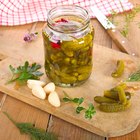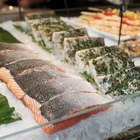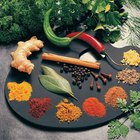KarpenkovDenis/iStock/GettyImages
Canned foods are processed and preserved in airtight containers for future use. Stored under recommended conditions, canned foods provide a safe and convenient alternative when fresh foods are not available. Despite their rugged look, storage cans are not indestructible and require a certain level of care during storage. Exposing cans to excessive temperatures compromises the integrity of the container, putting the food inside at risk of becoming unsafe to eat.
Ideal Storage
The ideal storage conditions for canned goods are cool and dry, with steady temperatures between 50 and 70 degrees Fahrenheit. Keep canned foods away from direct sunlight or water pipes, furnaces, hot water heaters or cooking appliances that may produce heat. Garages and uninsulated buildings or storage facilities are not ideal for storage because of extreme temperature fluctuations. Designate a cabinet and cupboard inside your home where temperatures remain steady.
Higher Temperatures
Canned goods that remain in temperatures above 70 degrees F for extended periods are prone to loss of nutrients and overall food quality. Once the temperatures reach 100 degrees F or more, the safety of the food stored in the cans comes into question. Prolonged storage in high temperatures causes foods to react with the inside of the cans. Eventually, the cans may become corroded and the food may become unsafe to eat.
Signs of Spoilage
Look for signs of damage in cans stored in excessive temperatures. Once a can is damaged, spoilage is sure to follow. Bulging or loose lids, for example, are a sign of spoilage. Some cans will actually begin to leak and weaken along the seams. Bad odors emitting from the can are also a sign that the food inside is spoiled and should not be eaten.
Recommended Storage Times
How long canned goods are stored is just as important as the storage temperatures. Always use the oldest cans in your cabinet first. Discard low-acid canned foods -- most vegetables -- after 12 months. Discard all canned meats and seafood after 12 months as well. Higher-acid foods, such as canned fruits and pickled items, usually keep for up to 18 months. Consume canned fruit juices within three years.
Related Articles
How Long Can Food Stored in Canning ...

Problems With Black on Canning Jar Rim

Does a Chilled Champagne Bottle Need to ...

How to Vacuum Seal Jars
How Long Are Canned Meat & Vegetables ...

How Long Can I Keep Food Safe in a ...

Does Canned Soup Go Bad?

How Long Can a Bagel With Cream Cheese ...

How Long Can Fresh Salsa Be Left Out?
How Long Can You Keep Canned Salmon?

How to Dry Pack Long-Term Food in Mason ...

How to Cook Foil Packs in the Oven

FDA Food Storage Temperature Guidelines

Does Caviar Go Bad?
How Long After the Expiration Date Can ...

How Long Can You Keep Cooked Chicken ...

How Fast Does Cooked Spaghetti Squash ...

Can Bugs Grow in Spices Such As Paprika?

Can You Freeze Canned Goods?
Longest Lasting Supermarket Foods for ...
References
Writer Bio
Jonae Fredericks started writing in 2007. She also has a background as a licensed cosmetologist and certified skin-care specialist. Jonae Fredericks is a certified paraeducator, presently working in the public education system.